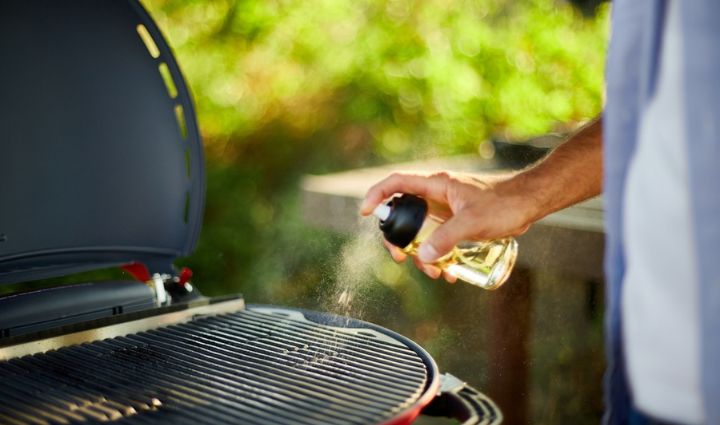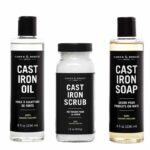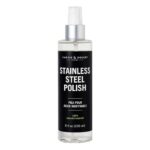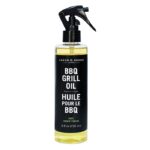Not all cooking oils are created equal, especially when it comes to grilling. Some oils pack a punch of flavor but will burn when cooked, while others have a neutral flavor but stand up well to high heat cooking. So which cooking oil should you use when you’re grilling?
When grilling, oil serves two very important functions: it prevents your food from sticking to the surface of your grill, and it seasons the surface of your cooking grates so they stay non-stick for cookouts to come. We’re not talking about oils in marinades or other flavorings—we’re talking strictly about preventing sticking and keeping your grill grates healthy. Think the splash of oil you add to your pan before you stir fry vegetables, not the oil that goes into your stir fry sauce.
There are two main factors to consider when you’re selecting a cooking oil for grilling:
- Smoke point
- Flavor profile
In most cases, smoke point is a greater consideration because most oils with a smoke point high enough for grilling are fairly neutral in flavor (we’ll explain why shortly—just keep reading). But what exactly is a smoke point, and why should you care?
In this post, we’ll take a closer look at smoke points to help you choose the best oil for grilling. We’ll cover:
- What is a smoke point anyway?
- Why do different oils have different smoke points?
- Cooking oil smoke point chart
- The best oil for grilling
- Cooking oils to avoid
Let’s get cooking.
What Is Smoke Point Anyway?
“Smoke point”, also known as “flash point” or “burning point”, is the point at which an oil stops shimmering and starts burning or smoking. All cooking oils have a smoke point.
When an oil is heated past its smoke point, the fat starts to break down and release free radicals that can be harmful to the body. It’ll also release a chemical called acrolein—the chemical that gives burned foods their acrid flavor and aroma. Not yummy.
Smoking fat isn’t always bad, such as when you’re searing steak, but most of the time, you’ll want to stay below a cooking oil’s smoke point. It’s also generally okay to use a lower smoke point oil over high heat if you only plan to do it for a short time (around 1-2 minutes).
Why Do Different Oils Have Different Smoke Points?
Traditionally, oils are extracted from nuts and seeds through a mechanical process of crushing and pressing. If they’re bottled immediately after extraction, they are considered cold-pressed raw or “virgin” oils. These oils tend to retain their natural color and are often packed with flavor, as well as minerals, enzymes, and other compounds that just don’t like heat. As a result, cold-pressed raw or virgin oils usually have a low smoke point and are best-suited to drizzling, dressing, and low-heat cooking—not grilling.
To produce oils with a higher smoke point, manufacturers use industrial-level refinement processes to eliminate the compounds that don’t interact well with heat, resulting in a neutral-flavored oil with a longer shelf life and a higher smoke point. These are the oils you’ll want to use when grilling.
Compare different smoke points in our cooking oil smoke point chart:
Cooking Oil Smoke Point Chart
Source: Masterclass.com, Serious Eats.
The Best Oil for Grilling
The best oil for grilling has a high smoke point and a neutral flavor. Refined avocado oil is our favorite cooking oil for grilling, but safflower oil, vegetable oil, or canola oil are also decent and easily accessible options. The high smoke point of these oils will stand up to the heat of your grill, and the neutral flavor will allow the flavors of whatever you’re grilling to shine through.
There are lots of neutral oils with a high smoke point you can use when grilling. Here are some of the best options:
- Refined avocado oil: A mild, buttery flavor with the highest smoke point. Works well with sweet or savory dishes.
- Refined or light olive oil: Unlike EVOO, refined olive oil is processed with heat to neutralize flavor and increase smoke point.
- Peanut oil: A light golden oil with a smooth, nutty flavor. Commonly used in asian or middle eastern cooking.
- Sunflower oil: A mildly flavored oil that won’t overpower other ingredients
- Corn oil: A neutral and affordable oil that is ideal for all high-heat cooking, including grilling and deep frying.
- Refined sesame oil: Unlike its more familiar cousin, toasted sesame oil, the mild, nutty flavor of refined sesame oil is neutral enough for broad use. If you want more intense sesame flavor, finish your dish with a drizzle of toasted sesame oil.
- Vegetable oil: Typically a blend of refined oils, commonly including soybean oil. Vegetable oil is inexpensive and neutral in flavor.
High smoke point oils are ideal for cooking, but if you’re looking for oils that will add flavor to your food, you can use an oil with a lower smoke point. Lower smoke point oils are safe to include in marinades, as well as for finishing dishes—just don’t use them directly on your grill grates for the purpose of preventing sticking.
Cooking Oils To Avoid When Grilling
Oils with lower smoke points will burn, lose flavor, and become carcinogenic much sooner than higher-heat oils, so save your favorite EVOO for salad dressings and vinaigrettes, dipping bread, or finishing foods with an artful drizzle.
We recommend avoiding oils with a smoke point below 350 (ideally 400) when grilling. Not only can they leave an unpleasant taste on your food, but they can also compromise the seasoning of your grill grates. Save these popular oils for marinades or for finishing dishes:
- Extra virgin olive oil: EVOO is robust in flavor with a low smoke point. It’s great for salad dressings, dipping bread, and finishing dishes, but it’s not ideal for grilling.
- Unrefined coconut oil: Unrefined coconut oil has a distinct coconut flavor and aroma, but a low smoke point. Opt for refined coconut oil instead.
- Butter: Butter has the lowest smoke point of all oils. It can handle a minute or two over high heat, but it’s not recommended for grilling.
If you’ve been using the wrong oil to season your grill grates, we recommend giving them a thorough cleaning and re-seasoning with a high smoke point oil.
Shop for grill cleaning products:
Wrapping Up
Using the right bbq grill accessories can simplify your grilling experience, improve the quality of your food, and even help to extend the life of your grill. Whether you’re replacing a worn out model or you’re investing in new outdoor grilling accessories or some of the best grilling gadgets for the first time, the start of a new season is the perfect time to take stock of your bbq grill accessories.




